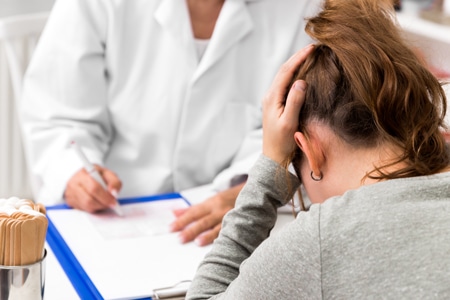Abusing drugs and alcohol has been known to cause many different effects on a person’s body and mind. One of the more confusing and intense symptoms of drug and alcohol use is psychosis. Alcohol or drug induced psychosis is a mental condition that disrupts how a person perceives and thinks about the world. When this occurs, it can be tough to figure out what’s real and what’s not. This break from reality can be distressing and debilitating.

Specific drugs have been shown to lead to psychosis (including alcohol-induced psychosis as well). During induced psychosis, a person may hear, feel, or see things that aren’t really there. Psychosis typically includes other symptoms and effects on a person as well. Drug or alcohol induced psychosis, in particular, is a psychosis that evolves from alcohol-related conditions. Psychosis may be fueled by preexisting mental conditions when paired with alcohol or drug abuse.
Developing psychosis can be extremely problematic and intense. Consistent drug use can make the situation much worse. If you or a loved one is suffering from drug or alcohol abuse, it may be time to get professional help. Over time, a person may begin to experience several negative effects on their body, mind, and life. Don’t wait; let Harmony Ridge help you today.
What is Psychosis?
Psychosis is a condition that disrupts a person’s thoughts and perceptions about the world around them. Often, a person may not be able to tell what is real and what is not. This can create many problems and can directly affect how they interact with their environment. Psychosis isn’t looked at as a specific mental illness but rather a collection of specific characteristic symptoms. Psychosis is a “break from reality” and involves cognitive perception changes along with hearing, seeing, or even feeling things that aren’t real or true.
As it stands, the reasons for psychosis aren’t fully understood or discovered just yet. However, there are a number of different factors that may lead to its development. These could include genetics (family history of psychosis disorders), chemical imbalances in the brain, certain life experiences, and alcohol/drug-induced psychosis. Psychosis disorders may be more prevalent than they appear with nearly 3 out of 100 people experiencing some sort of psychosis in their life.
Symptoms of Psychosis
While the main indicator of psychosis is a break from reality, other symptoms may also appear. Other common symptoms of psychosis may include:
- Trouble understanding what is real and what is not
- Incoherent speech
- Hallucinations
- Delusions
- Disrupted thoughts and perceptions
- Memory issues
- Inappropriate behavior (depending on the environment)
- Issues thinking clearly or concentrating
Symptoms of psychosis can be distressing and extremely confusing for a person. It can affect a person’s day-to-day life in some cases. When it comes to the two main effects of psychosis (elusion and hallucination), there is a difference between delusion vs hallucination. Delusions are far-fetched beliefs (believe they have a life-threatening illness or feel you’re being followed by the Federal Bureau of Investigation). Hallucinations are the sensory perceptions that a person experiences (hearing, seeing, or feeling things that aren’t there in reality). Both hallucinations and delusions can be stressful and problematic.
What is Drug and Alcohol Induced Psychosis?
There are certain cases where psychosis is a result of drug or alcohol abuse. A person may feel the effects of psychosis, especially when using a hallucinogen drug. In extremely rare cases, a person may experience psychosis as a side effect when using a prescription drug properly. Prescription drugs that may include psychotic side effects like:
- Antihistamines
- Antidepressants
- Cardiovascular medication
- Chemotherapy agents
- Muscle relaxants
- Anticonvulsants
- Corticosteroids
- Analgesics
If you or a loved one is experiencing psychotic effects from prescription medication, reach out to your doctor immediately. The chances of psychosis may sky-rocket if a person abuses these medications.
Some nonprescription and illegal drugs are also known to cause drug-induced psychosis effects. When abused, a person may experience hallucinations, delusions, and other effects. Common substances that can result in psychosis include the following:
- Cocaine
- Hallucinogens
- Alcohol
- Cannabis (marijuana)
- Opioids
- Amphetamines
- PCP
Alcohol abuse on its own can cause psychosis. If a person abuses alcohol on a regular basis for days or even weeks, they may experience the effects of psychosis. Those who have abused alcohol for years will be prone to feeling episodes of extreme paranoia and hallucinations. For both alcohol or drug induced psychosis, when a person cannot tell what’s real and what’s not, this is when help is needed.
Psychosis Caused by Withdrawal

When someone abuses drugs or alcohol for a certain amount of time, they develop a dependency on the drug. This means that when they stop taking the drug, their body will begin to experience strong urges and withdrawal effects. This is one of the biggest indicators of a drug/alcohol addiction. These withdrawal effects can be stressful, painful, and involve psychosis as a possible symptom in some cases of long-term abuse.
Drug induced psychosis as a withdrawal symptom is commonly seen in cases of alcohol addiction. The longer a person has been abusing alcohol and the severity of their abuse increases the risks of alcohol induced psychosis. Many people don’t realize the severe effects that alcohol abuse can have on the mind. This negative effect can increase the chances of alcohol induced psychosis by a large margin.
Delirium Tremens
Psychosis might be one of the symptoms of delirium tremens. This is a set of symptoms that occurs when a person stops taking a drug. These can be intense and are known as a medical emergency. Delirium tremens includes intense psychotic symptoms as well. It’s important to be aware of the symptoms so you can get help immediately. Delirium tremens symptoms include:
- Fatigue
- Delirium
- Excitement/agitated
- Body tremors
- Hallucinations
- Sensitivity to light and sound
- Seizures
- Mental function changes
- Lowered attention span
- Confusion/disoriented
Contact medical assistance immediately if you noticed these signs (which may be combined with psychosis symptoms).
Drug or Alcohol Induced Psychosis Treatment Options
Psychosis is a set of symptoms instead of a condition. While they may be temporary (last a few hours or days), drug-induced psychosis can be very serious and disruptive. Oftentimes, psychosis needs emergency medical attention and intervention. The effects of psychosis can be so serious that one in five people with a history of psychosis attempt suicide. When it comes to drug or alcohol-induced psychosis, the biggest help is to stop abusing drugs. However, this is much easier said than done.
Oftentimes, the best course of action is to reach out for comprehensive and full treatment. The withdrawal symptoms of drug abuse alone can make it tough for anyone to stop using. Drug addiction can change a person’s perception and needs as time goes on. Fortunately, professional care like our at Harmony Ridge can help you combat your addiction effectively and safely.
Detoxification

Detoxification is a process that rids the body completely of a substance or alcohol. This also helps relieve some of the withdrawal symptoms when a person stops using. Detox is the first step of almost every single case of addiction. After detox is complete, a person will most likely move onto more personalized treatment through a rehab program.
Treating cases of drug addiction with potential psychosis as a symptom can be tricky. However, psychosis may not be an issue during the actual detox phase. Psychosis may be a factor after detox (through withdrawal symptoms). This is why it’s important to follow up the detox process with a rehab program (inpatient or outpatient).
Inpatient or Outpatient Treatment
After detox, a person will either move on to inpatient or outpatient treatment. While you get the same type of treatment in both, there is a difference between the two. Inpatient treatment has a person staying in a rehab center while outpatient treatment has a person only attending weekly sessions in the rehab. Inpatient treatments are recommended for those dealing with intense cases of addiction so they can have 24/7 support.
Both treatment methods employ different types of therapy and medication help. Every case of addiction is different from the next. With this in mind, individual or group therapy can help you overcome some of your negative thought processes and behaviors. After a person has gone through their treatment, they’ll be guided to relapse prevention. One of the most important parts of addiction treatment is knowing how to deal with urges and cravings to use again.
Start Your Journey at Harmony Ridge
Alcohol or drug induced psychosis can be problematic and negative for a person dealing with drug addiction. It’s important to get help from a trusted and safe facility like Harmony Ridge. We make sure that you are treated by the best medical professionals and staff in West Virginia. No matter how severe your addiction may be, it is not too late to get comprehensive help. Start your journey towards a drug-free life today. Contact us today to learn about all our treatment options and addiction resources for you or a loved one.



